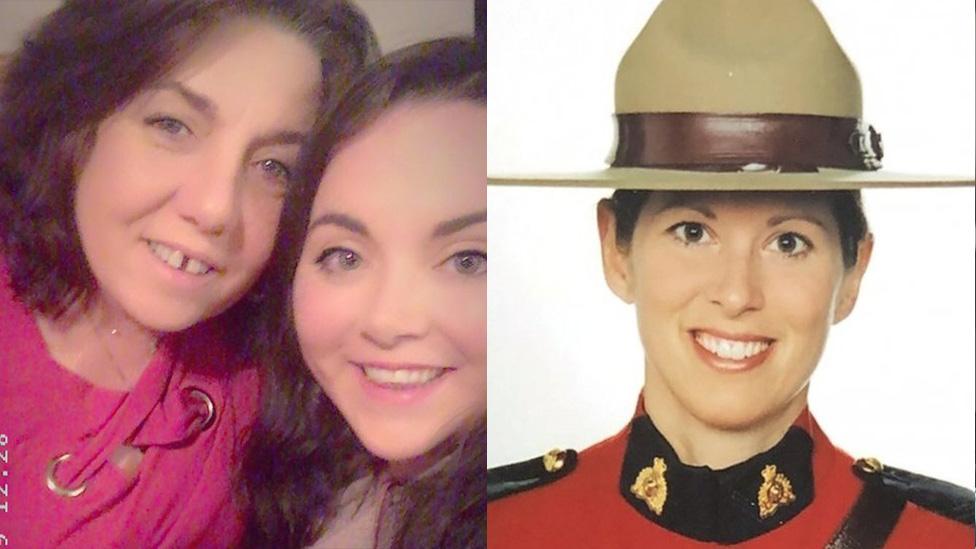Could Canada's worst mass shooting have been avoided?
- Published
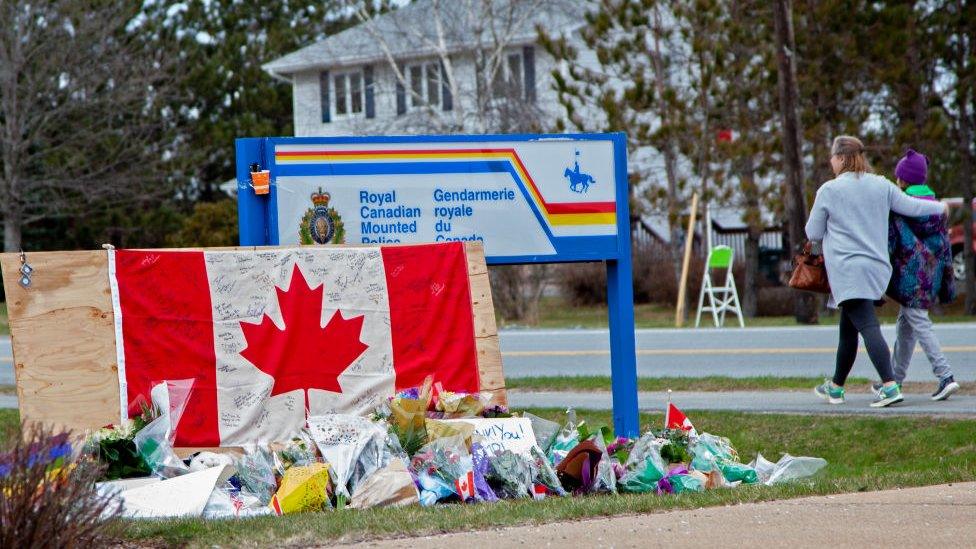
Three months after a gunman posing as a police officer went on a rampage across the province of Nova Scotia, questions still remain about Canada's deadliest mass shooting, and why the Royal Canadian Mounted Police couldn't stop it.
When police arrived at the first crime scene at 10:36pm on 18 April, in a quiet cul-de-sac in the the seaside community of Portapique, they found a bloodbath.
Several bodies were strewn in the street and buildings were on fire. Over the course of the next few days, police would find 13 victims across seven different locations in that single neighbourhood.
"Nobody really understands. Everybody knows it was an unimaginable thing that happened there," Tom Taggart, a local politician in Portapique, told the BBC.
"You can't visualise. You couldn't possibly understand what it was like there that night."
An hour later, RCMP tweeted they were investigating a "firearms complaint" in Portapique and that people in the area should lock their doors and stay inside.
It would take eight hours before they sent another tweet, and another two after that for police to tell the public that the gunman was wearing a police uniform and driving a police cruiser.
At 11:26am, police caught up with the gunman, Gabriel Wortman, at a petrol station 95km (59 miles) south of where his crime spree began. He died in a shootout with police.
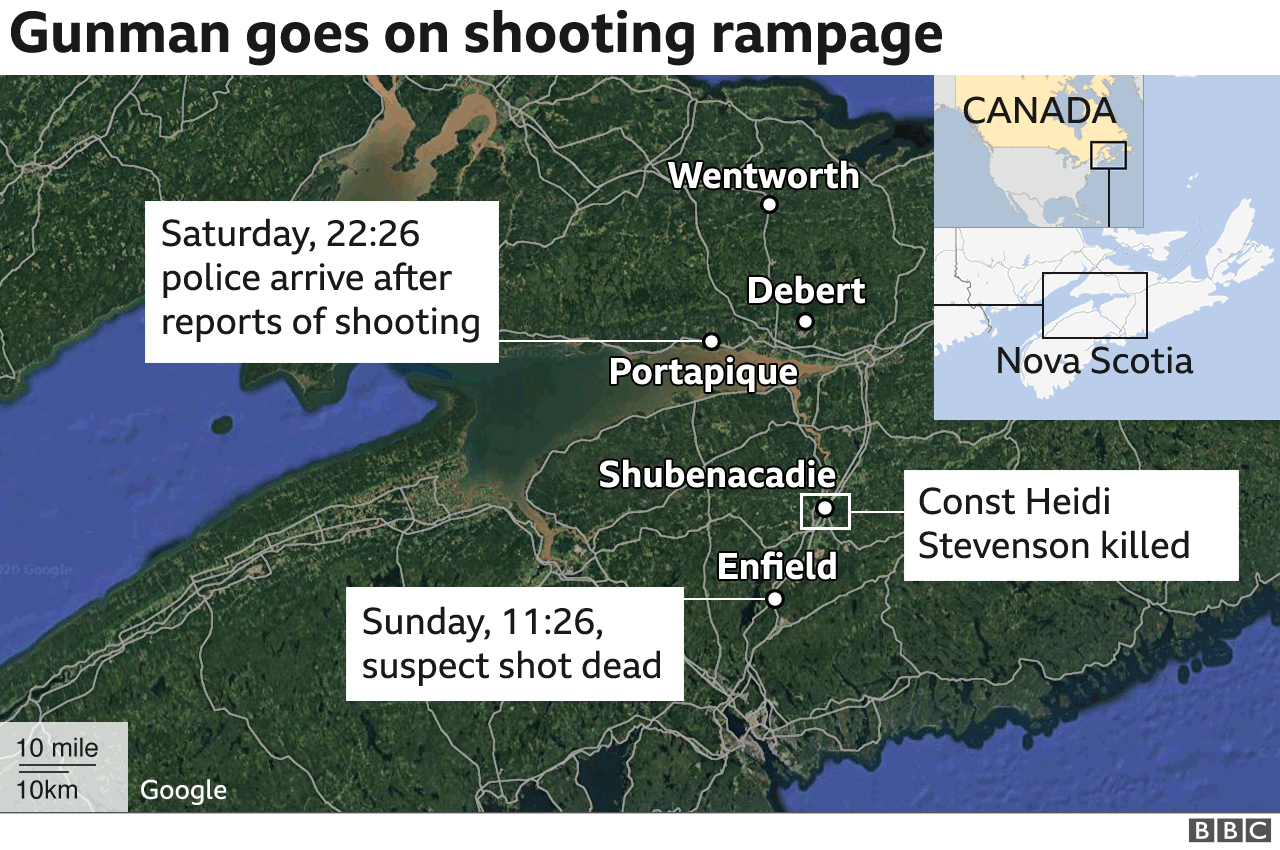
Over the course of that evening and early morning, Wortman would kill a total of 22 victims, including two frontline healthcare workers, a primary school teacher and RCMP Constable Heidi Stevenson, a 23-year veteran of the RCMP and mother of two. All were adults, except for 17-year-old Emily Tuck, who was killed alongside her two parents.
The complexities of the case meant that it took several days to identify all the victims, and several more before the police could release a timeline.
From the outset, people have demanded an inquiry into the RCMP's response to the shooting.
"I desperately want to know what led to this. And that's what the inquiry needs to be and it should be happening now," Mr Taggart said.
Why didn't the RCMP send out an emergency alert as early as Saturday evening?
Why did they only alert the public that Wortman was impersonating an officer the following morning, hours after a witness told him he was driving a police cruiser?
How did he get access to a decommissioned police cruiser in the first place?
How did he amass a collection of illegal weapons from the US?
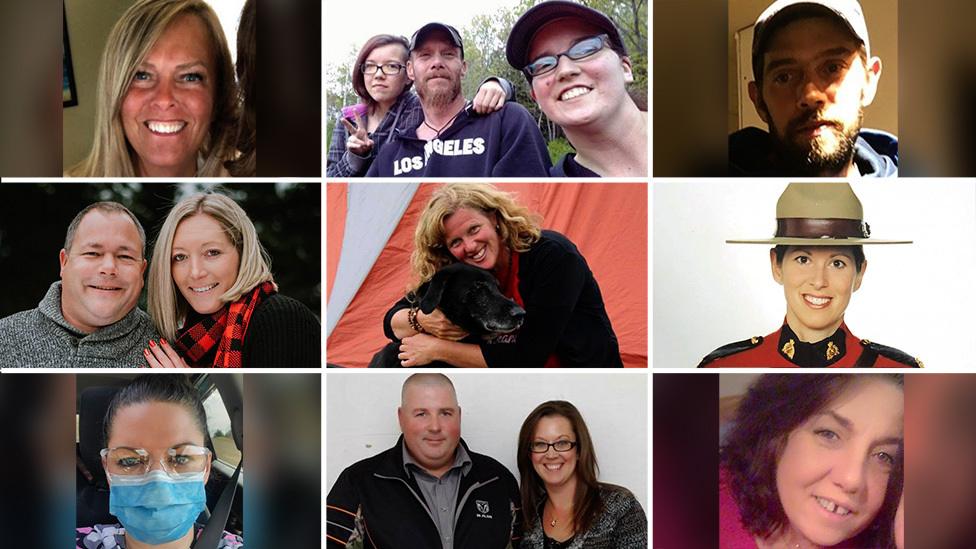
Victims of Canada's largest mass shooting
"We need answers to heal, we need answers so we can find a way to live in this new normal that we've been forced into," wrote the daughter of one of his victims, external, Heather O'Brien, in a letter published on Facebook on 31 May.
Darker questions have also emerged, such as why police ignored reports of the gunman's violent behaviour towards women, or why they ignored warnings he was amassing an arsenal and wanted to "kill a cop", and how he was able to liquidate C$475,000 ($350,000, £279,000) from his account in a single transaction.
Officials keep promising an inquiry is forthcoming, but so far it hasn't materialised.
Nova Scotia Justice Minister Mark Furey declined an interview, but a ministry spokesperson said this:
"We recognise Canadians are looking for, and deserve, answers about the tragic events that happened in April. The Nova Scotia Department of Justice is actively engaged with the federal government on this matter and an announcement is forthcoming. We are committed to ensuring we take the necessary steps to support victims and families as we move toward an announcement."
In the absence of an inquiry, several legal cases have emerged.
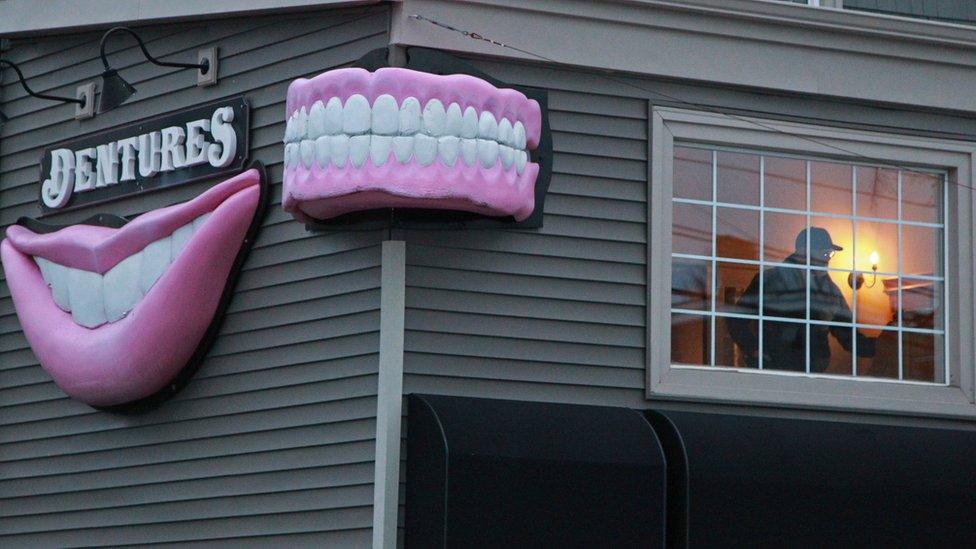
The gunman was a denturist with a clinic in Dartmouth, Nova Scotia
Members of the media are going to court to release documents about the investigation. Wortman's victims and their families have filed a class-action lawsuit against his estate, and another class-action lawsuit has been filed against the RCMP, the federal attorney general and the attorney general of Nova Scotia.
"We will review and consider any such claim once served. We do not anticipate having any further comment on this matter. Our primary focus continues to be on the ongoing criminal investigation, and supporting the victims of this tragedy as well as our members and employees," RCMP spokesperson Corporal Jennifer Clarke said in a statement.
Mrs O'Brien's husband, Andrew O'Brien, is one of two named plaintiffs in the case against the RCMP. The class-action lawsuit has not been certified by the courts yet, a procedure that can take up to a year.
The lawsuit alleges the RCMP "breached the standard of care expected of them" and behaved in a "high-handed, self-serving and disrespectful manner" to victims and their family during the course of their investigation, which is ongoing.
This "disrespectful manner" is illustrated in one of the lawsuit's most shocking claims, that the RCMP released a vehicle containing bullet casings and body parts back to the family member of a victim.
Cpl Clarke told the BBC exhibits are usually returned in the condition that they were found in.
One of the biggest questions left unanswered is what the RCMP knew about Wortman before the shooting.
An explosive investigation by Maclean's Magazine revealed that Wortman received a large cash withdrawal from a Brinks depot estimated at about C$475,000 on 30 March. Maclean's quotes sources, external who say the transaction was consistent with the kind the RCMP would use in a pay-out to a police informant.

The decommissioned patrol car driven by Wortman was bought at auction
The RCMP deny the police force was a source of his money, and have said they believe Wortman was concerned it would not be safe in a bank, possibly because of coronavirus.
A financial audit is taking place as part of their investigation.
"The RCMP was not the source of those funds, as has incorrectly been assumed in some recent media articles," Cpl Clarke said in an email.
But the Maclean's report has planted seeds of doubt amongst the community, who wonder if the police turned a blind eye to some of the gunman's previous behaviour.
"If the RCMP allowed somebody that volatile to live amongst innocent people, then somebody needs to be looking for work," Mr Taggart says.
Although Wortman didn't have a criminal record, he was known to the police. He was charged with assaulting another man in 2001, and pleaded guilty. He received a conditional discharge, which meant he did not go to jail and his record was clean.
He was also frequently involved in civil disputes; in two cases, including one involving his uncle, people claimed he tried to swindle them out of property, according to Global News Canada, external.
In 2011, a police bulletin was sent out a warning that Wortman wanted to "kill a cop" and that he had a stash of guns.
The bulletin, which was obtained by CBC News, external and confirmed by the RCMP, was released after an anonymous tip to Truro police. Halifax Regional Police investigated, but determined that the guns were stored in his cottage in Portapique, which is under the jurisdiction of the RCMP, the CBC reported.
An RCMP spokesperson told BBC News that police bulletins were typically wiped from the records after two years and the bulletin on Wortman was not accessible to police during April's rampage.
"Investigators continue to look into the gunman's previous behaviours and interactions, including those with police," Cpl Clarke said in an email.
Two years after the police bulletin, his neighbour Brenda Forbes says she told the RCMP he was beating his girlfriend, and that she had seen illegal weapons on his property.
She told her story to various media, external after the shooting.
She says she had been wary of the gunman for years before she reported him to police. In about 2005, a year after the gunman moved next door, his girlfriend had run to Ms Forbes' door, afraid he was going to kill her.
Ms Forbes says she tried to convince her to leave him, but she could not. She says the RCMP did not follow up, and nothing was done.
The RCMP confirmed they received a complaint from a neighbour in 2013, but that the file has since been purged.
"From the officer's notes there is no indication of abuse or weapons but there is mention of names of the alleged involved parties, including the gunman," Cpl Clarke said in an email.
That same girlfriend was Wortman's first victim, the night before he went on the shooting spree. She survived by hiding in the woods, and had since become a key witness in the RCMP investigation.
The RCMP has called her assault significant, and said it "could very well have been a catalyst" for the subsequent murders.
After the shooting, Ms Forbes told her story to Linda MacDonald and Jeanne Sarson, co-founders of Persons Against Non-State Torture, a local organisation working to end domestic violence around the globe.
They say the police failure to take Ms Forbes seriously was because of implicit misogyny that made them ignore reports of domestic violence.
"It disappointed me, that the RCMP would dismiss such serious allegations. It left me feeling if something had been done a long time ago we wouldn't be at this place now," Ms MacDonald told the BBC.
Ms MacDonald believes that violence against women is often a warning sign of future violent behaviour. A recent analysis by Bloomberg, external of 2,358 mass shootings of four or more victims in the US by Reuters found that 60% of the perpetrators had a history of domestic violence.
"If they had acted earlier, my feeling is there would have been a prevention," she says.
Ms MacDonald and Ms Sarson have called for a public inquiry "with a feminist lens", gathering nearly 8,000 signatures in a petition submitted Monday.
"The mass murders in Nova Scotia were not 'senseless.' They were predictable," the petition reads.
Ms MacDonald is especially concerned because Mr Furey, the provincial justice minister, has gone on the record saying the province is working on a "restorative" justice approach.
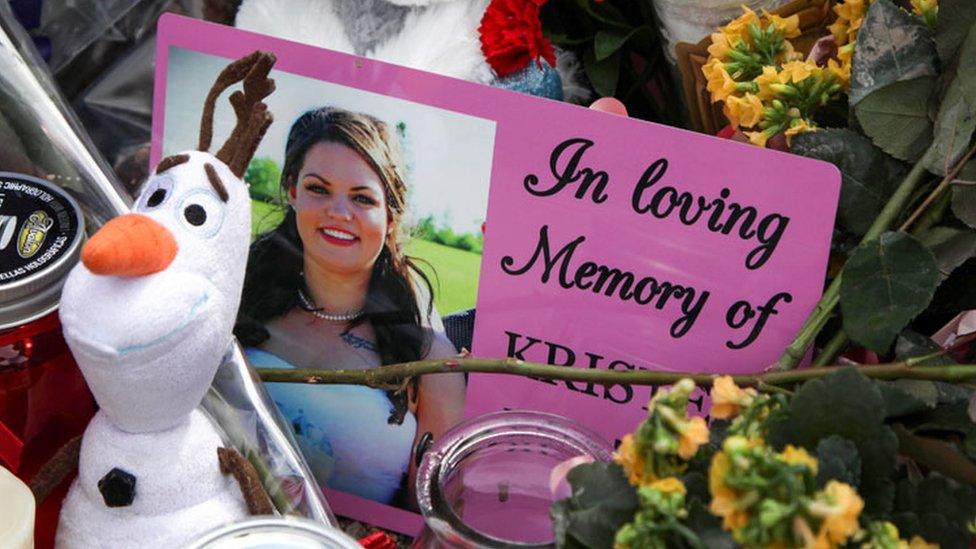
A photograph of Kristen Beaton, one of Wortman's victims, at a memorial in Debert
A restorative justice inquiry is an approach sometimes recommended when all sides agree one party has been wronged. Usually the wronged party is given a chance to talk about how they were harmed, and the party responsible makes amends.
It often happens outside the court system, often behind closed doors.
"It really needs to be public - there's nothing restorative when we make the horror in our communities silent," Ms MacDonald said.
Mr Taggart, the local politician from Portapique, is not in favour of an inquiry that only focuses on feminism.
"The guy was a misogynist bastard... the way he treated women can be part of this inquiry, but it should not lead this inquiry," he said.
And he's not in favour of an inquiry that only looks at the tragedy in his own community - that would just re-traumatise people, he says.
What he does want is for the RCMP to answer his nagging questions about why Wortman was never investigated for weapons offences, and how he got away after the massacre in Portapique.
"The RCMP, I believe, needs to answer questions, under oath and before a judge," he says.
- Published22 April 2020
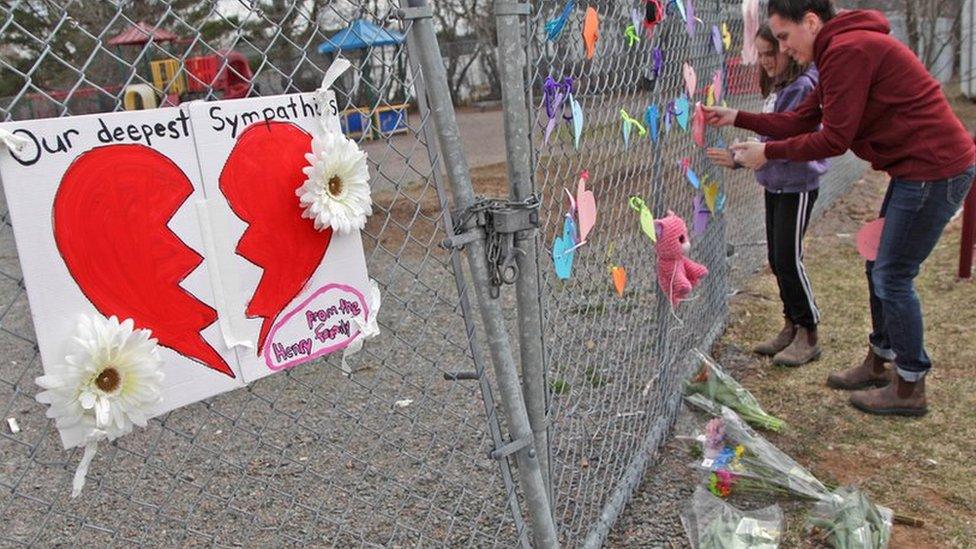
- Published20 April 2020
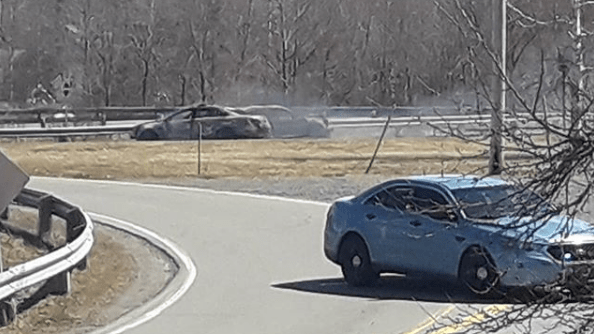
- Published21 April 2020
